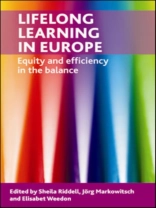The ongoing economic crisis raises fundamental questions about the political and social goals of the European Union, particularly the feasibility of harmonising social and education policy across member states. The forward momentum of the European project is clearly faltering, raising the possibility that the high water mark of European integration has been achieved, with implications for many aspects of education and social policy, including lifelong learning. This timely book makes a major and original contribution to the development of knowledge and understanding of lifelong learning in an expanded Europe. Its wide range of contributors look at the contribution of lifelong learning to economic growth and social cohesion across Europe, focusing its challenge to social exclusion. It draws on comparative data from the EU Sixth Framework Project Lifelong Learning Policy and Practice in Europe (LLL2010), which ran from 2005 – 2011 and involved twelve European countries and Russia. Very little research has been conducted to date on the nature of lifelong learning in post-Soviet countries, and this book provides important insights into their evolving education and lifelong learning systems. The book will be of interest to researchers and academics in the UK and Europe, especially those from social policy, adult and comparative education, equality studies and practice of lifelong learning.
About the author
Sheila Riddell is the founding Director of the Centre for Research in Education, Inclusion and Diversity (CREID) at the University of Edinburgh. Her research interests are in equality and social inclusion in relation to education, employment and social care. Jörg Markowitsch is founder and senior partner of 3s Unternehmensberatung Gmb H. His research interests are vocational education and training, lifelong learning and European education policy. Elisabet Weedon is a Senior Research Fellow at the University of Edinburgh. Her research interests are in the area of social justice and lifelong learning.












